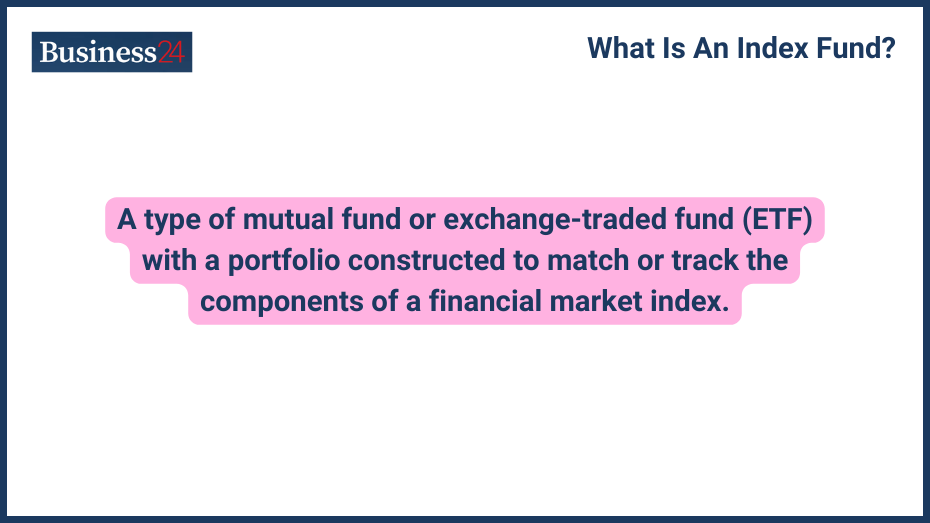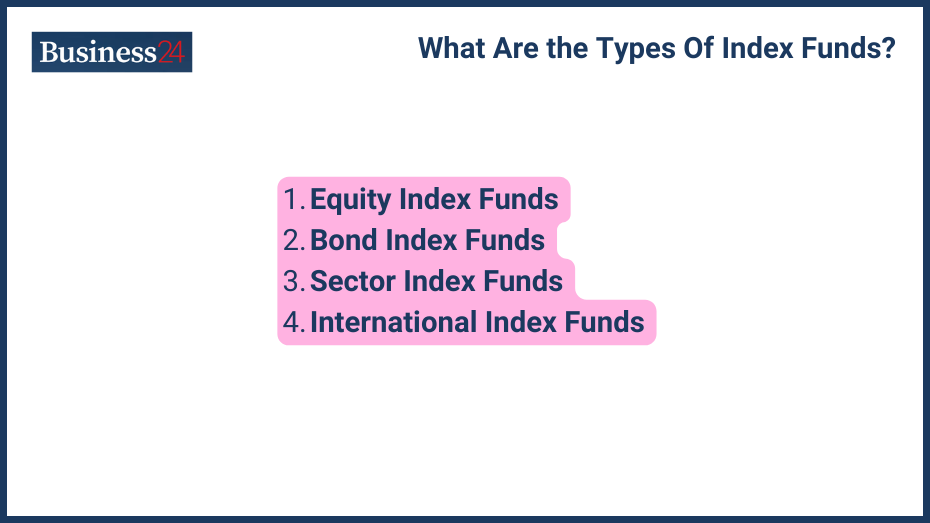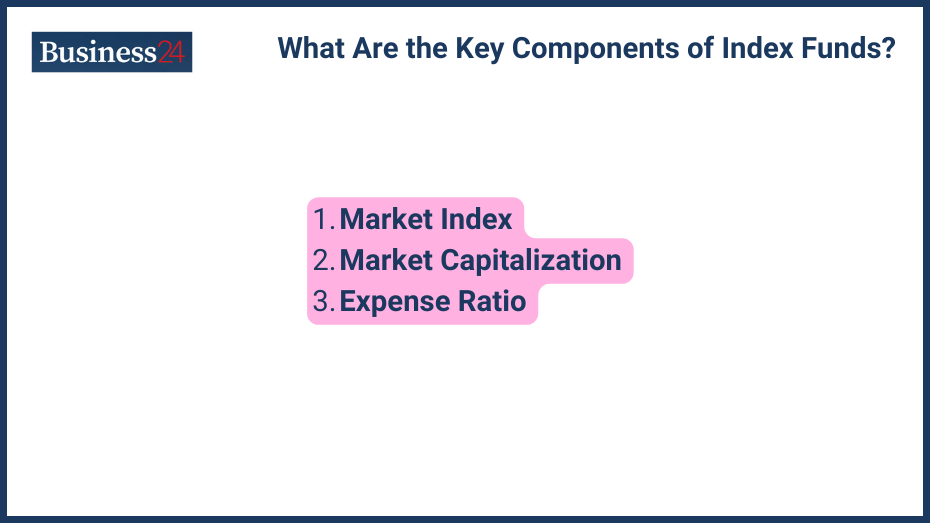
A type of mutual fund or exchange-traded fund (ETF) with a portfolio constructed to match or track the components of a financial market index.
An index fund is a fund that tracks the returns of a market index. It is popular among positional traders and especially investors. Those who do not want to put money into stocks because of their volatile nature can look for index funds, as they are less volatile than stocks.
What is an Index Fund?
Think of an index fund as a pool of securities an index contains on which you can invest. Going by the definition, an index fund is a type of investment instrument, either a mutual fund or an exchange-traded fund (ETF), that tracks the performance of a particular market index. These indexes, like the S&P 500 or the Russell 2000, represent a basket of securities within a specific market segment.
Index funds serve a critical purpose for investors. If you want to gain exposure to the broader market, index fund investments can help you here. The diversification in various securities under the index helps reduce the risk associated with relying on the performance of a single company or a small group of companies.
How Do Index Funds Work?
You may find index funds as a boring investment; you may not see high volatility and frequent buying and selling. Unlike actively managed funds, managers constantly buy and sell securities, index funds use a passive investment strategy. Index funds hold a portfolio of assets that closely mirror the composition of the target index they are tracking.
Now, this approach is good for many things, like churning or missed opportunities. Also, this passive approach translates to lower management fees for index funds compared to actively managed funds. Index funds rebalance their portfolios from time to time to maintain alignment with the underlying index.
What Are the Types of Index Funds?

There are various types of index funds for the needs of various kinds of investors:
- Equity Index Funds: The most popular index funds are equity index funds, and it is my favourite index funds. Index funds track stock market indexes, such as the S&P 500 or the Nasdaq Composite, providing exposure to a large segment of the stock market.
- Bond Index Funds: As the name suggests, bond index funds track indexes composed of bonds issued by governments or corporations. Examples of bond index funds are Vanguard Total Bond Market Index Fund Admiral Shares (VBTLX), with an expense ratio of 0.05%, and Schwab U.S. Aggregate Bond Index Fund (SWAGX), with an expense ratio of 0.04%.
- Sector Index Funds: let’s say you are bullish on any sector like EV, solar, etc. you can invest in specific sector index funds. Sector index funds allow s you to invest in high-growth potential sectors but remember it can be highly volatile too.
- International Index Funds: If you want to invest in a foreign market, you can do so through international index funds. These funds track indexes of stocks or bonds from various countries or regions around the world. For example, if you want to invest in an emerging country like India, you can buy Nifty index funds.
What Are the Key Components of Index Funds?

If you want to invest in index funds, you should know its mechanics as an investor.
Market Index: The market index is the underlying asset of the index funds. The performance of the index funds will highly depend on the performance of the market index.
Market Capitalization: Market cap is the total market value of a company; companies with larger market cap have more significance in the index’s performance because many index funds measure their holdings based on market capitalization.
Expense Ratio: You’ll have to pay some management and operational fees as you do for any other instruments. This annual fee is known as the expense ratio. While investing in funds, it is very important to check the expense ratio to see if it is not too high. As I have mentioned earlier, index funds require less management than other funds, so they generally have a lower expense ratio.
For example, if a fund has an expense ratio of 0.05% and you invest $10,000, then your you have to pay a $5 fee.
What Are the Benefits of Investing in Index Funds?
Index funds are very beneficial for those who want to invest in a border market with less volatility. The benefits of investing in index funds are:
Diversification: The reason people choose index funds is because of the diversification factor. By investing in index funds, you spread your investment in the broader market index. This reduces the impact of a single company’s performance on your overall portfolio.
Cost-Effectiveness: Index funds follow a passive management approach, and that helps lower the expense ratio. Index funds have lower expense ratios as compared to other actively managed funds.
Simplicity: Index funds are easy to understand and manage. They are a suitable option for long-term investors who don’t want to actively research and select individual stocks or bonds.
What Are the Risks Associated with Index Funds?
Market Risk: Sometimes, the market can also be in correction or consolidation and can impact the index funds’ performance. For example, the S&P 500 was in correction mode from starting of June 2022 to mid-2023; this had a big impact on the index fund return in the period.
Lack of Flexibility: Unlike actively managed funds, index funds don’t try to beat the market by frequently buying and selling stocks. This might seem like a downside for investors who want to take advantage of short-term market changes.
Tracking Error: Although index funds aim to mirror the performance of their target index exactly, there can be slight deviations due to various factors like expense ratios and how the fund replicates the index.
Is it good to invest in index funds?
According to the investment goals and risk appetite, every individual has a different answer to this question. It depends on you; you can choose the index funds if you want lower risk, volatility, and potential profit.
Index funds are generally considered a sound long-term investment strategy for most investors, particularly those who want diversification and a hands-off approach. But, if you aim for higher profits, you can choose other actively managed funds.
What Are the Investment Strategies with Index Funds?
Buy and Hold: Suitable for long-term investors looking for steady growth.
Most investors invest in index funds for long-term investment so it can compound over the years. Long-term holding will save you from short-term market fluctuations and also missed opportunities. This approach leverages the historical tendency of the market to trend upward over extended periods.
For example, The S&P index fund return over the period of 1999 to 2024 is 684.6% an annualized return of 10.8%.
Dollar-Cost Averaging: Investing a fixed amount regularly to mitigate market volatility
Dollar-cost averaging is one of the most famous forms of regular investing. In DCA, you must invest a fixed amount of money into your chosen index fund at regular intervals, regardless of the current market price.
This helps to average the cost per share over time and controls the impact of market volatility. DCA is a disciplined approach suitable for long-term investors.
Tax-Efficient Investing: Utilizing index funds for their typically lower capital gains distributions
Index funds are a valuable tool for tax-efficient investing. Since they are passively managed and typically experience lower turnover of holdings compared to actively managed funds, they tend to generate fewer capital gains distributions. This translates to lower tax liabilities for investors, especially those who invest in taxable accounts.
Are index funds Better Than stocks?
Again, there’s no simple answer to whether index funds are definitively better than individual stocks!! Both options have distinct characteristics. Index funds offer instant diversification by providing exposure to a basket of securities. Picking stocks requires research, and there is no diversification when buying a stock.
However, choosing a fundamentally good stock can give way more return than index funds. As I mentioned earlier, the return of S&P from 1999 to 2024 was 680%, and Amazon, from its IPO in 1997 till now, has given more than 100,000%. You can see the huge difference in the returns.
How Do Index Funds Compare to Other Investments?
Vs. Actively Managed Funds
Index funds have lower expense ratios due to their low churning. However, actively managed funds, focusing on potentially outperforming the market, might appeal to investors seeking higher returns, although there’s no guarantee of success.
Vs. Individual Stocks
The differential factor in stocks and index funds comes in the returns and diversification. Index funds are easy to invest in and diversify; while investing in stock, you have to research the company thoroughly and carry more risk as there is no diversification.
Vs. Bond Funds
Bond funds offer a different risk reward compared to equity index funds. Bond funds typically have lower volatility but may also offer lower potential returns. The choice depends on your risk tolerance and asset allocation goals.
What Are the Practical Applications and Case Studies?
Case Studies
In the last 30 years, the SPDR S&P 500 (SPY) ETF obtained a 10.47% compound annual return, with a 15.14% standard deviation. So, if you invested $10,000 in the SPY ETF funds 30 years ago, compounded annually at the rate of 10.47%, it would have been $198,303.61.
Is the S&P 500 an index fund?
No, the S&P 500 is a stock market index that tracks the performance of 500 large-cap companies listed on stock exchanges in the United States. Index funds, such as the SPDR S&P 500 ETF (SPY), aim to replicate the performance of the S&P 500 by holding the same companies in proportion to their weighting within the index.
What Educational Resources and Tools Are Available?
Various articles, research papers, and books are available on investing in index funds. Some of the books on index funds are All About Index Funds, The Index Fund Solution, and Index Funds: The 12-Step Program for Active Investors.
Many courses are available if you want to learn in a structured way. They all may not be worth it, but if you want to learn the basics, there are some courses out there that can help you. Also, Online calculators and planning tools can help you determine your investment goals, asset allocation, and potential returns when incorporating index funds into your portfolio.
Disclaimer
eToro is a multi-asset platform which offers both investing in stocks and cryptoassets, as well as trading CFDs.
Please note that CFDs are complex instruments and come with a high risk of losing money rapidly due to leverage. 51% of retail investor accounts lose money when trading CFDs with this provider. You should consider whether you understand how CFDs work, and whether you can afford to take the high risk of losing your money
This communication is intended for information and educational purposes only and should not be considered investment advice or investment recommendation. Past performance is not an indication of future results.
Copy Trading does not amount to investment advice. The value of your investments may go up or down. Your capital is at risk.
Don’t invest unless you’re prepared to lose all the money you invest. This is a high-risk investment and you should not expect to be protected if something goes wrong. Take 2 mins to learn more
eToro USA LLC does not offer CFDs and makes no representation and assumes no liability as to the accuracy or completeness of the content of this publication, which has been prepared by our partner utilizing publicly available non-entity specific information about eToro.
